Summary: Just when you think Google's search results couldn't get any smarter, they go and create the Knowledge Graph. But what happens when other "smarter search results" features show up due to misunderstood search intent? Google's good, but it's still AI (artificial intelligence) so every once and a while we spot search results that have us scratching our heads. Today we examine one of those examples and briefly analyze Burlington and Winooski Knowledge Graph information.
Yesterday we talked about
Google's new "Knowledge Graph", and specifically the latest feature - the Carousel. Today's post isn't as much of an in-depth look as much as it is a highlighting of at some other funny/odd occurrences I stumbled on while testing the Carousel for the other post.
Google Knowledge Graph: Burlington vs. Winooski
Before we get to the really odd results I found when I searched for 'great escape', let's quickly review something interesting I discovered about the Knowledge Graph when searching the names of a couple of Vermont cities. Take a look and see if you notice the differences between these screenshots of search results for "
winooski, vt" and "
burlington, vt":
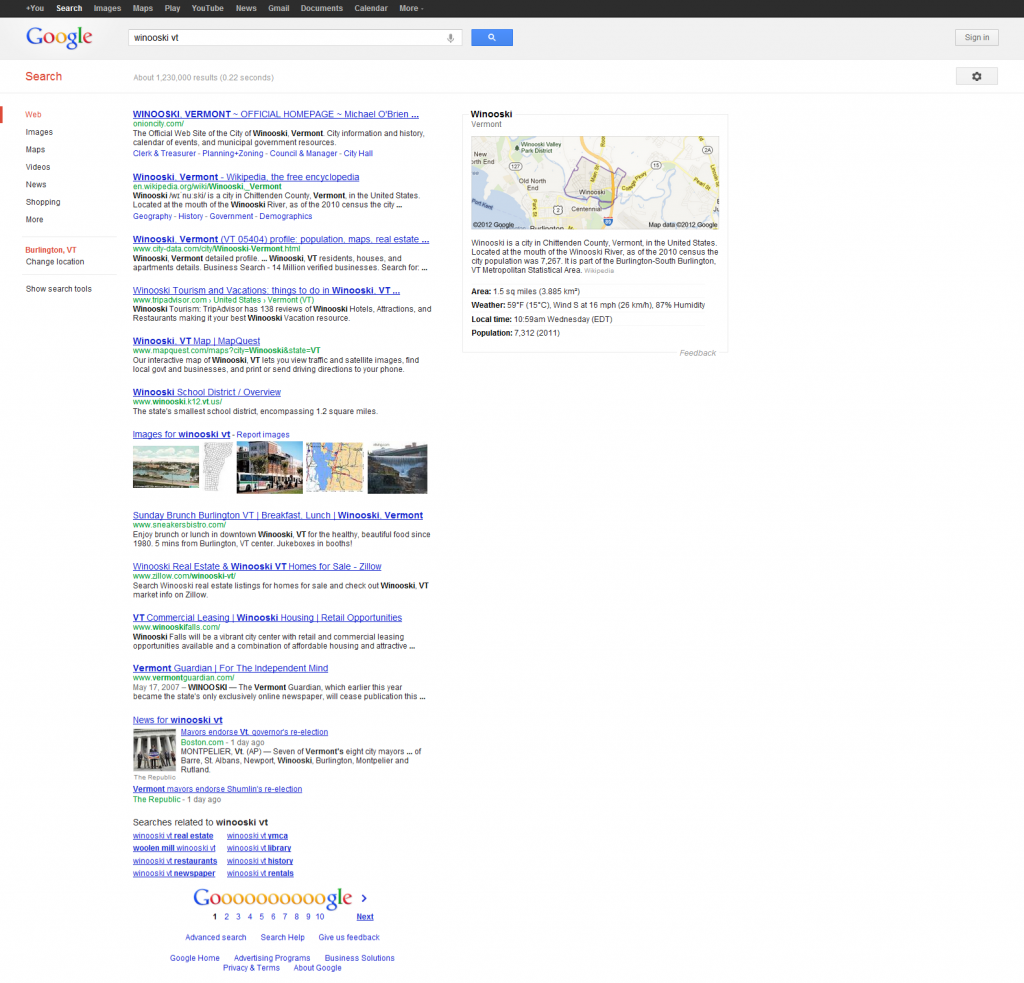
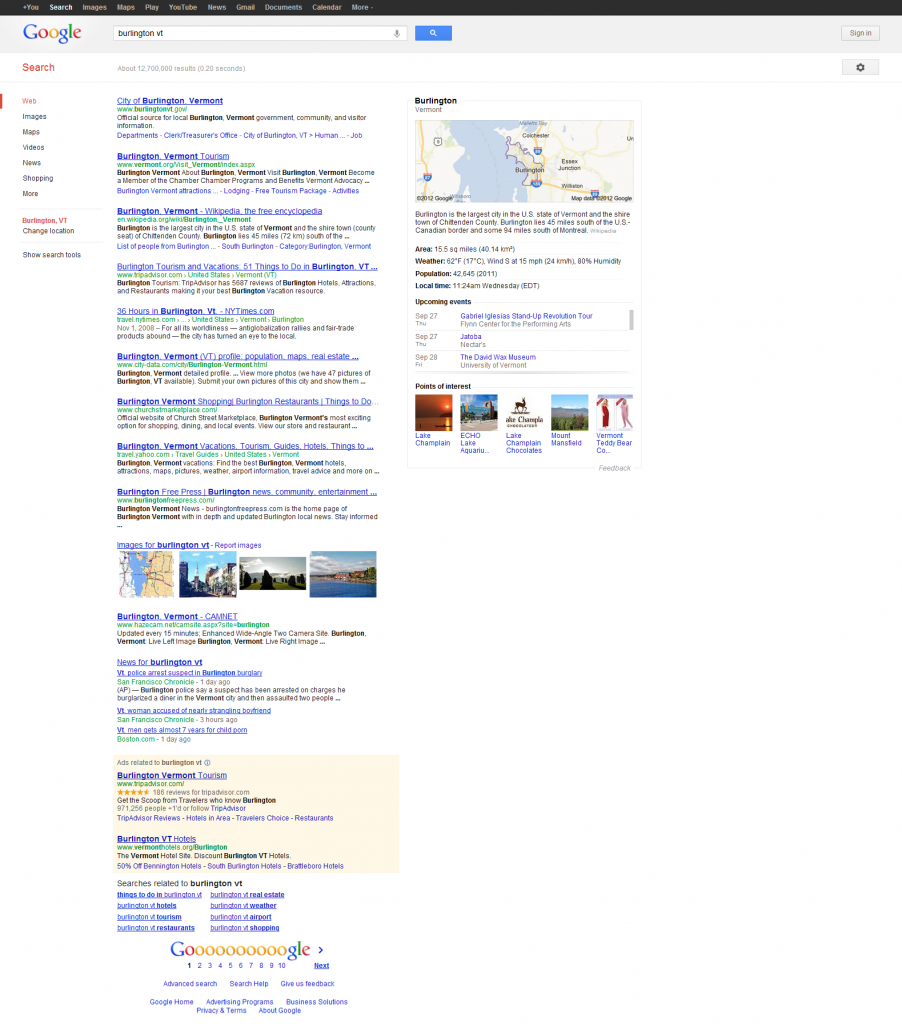
Both searches are so generic that Google displays the knowledge graph because they safely assume that there's a good chance the user is looking for general information. Under the basic description area, Burlington's knowledge graph shows the following 4 data points and in this order: Area, Weather, Population, Local time. Winooski shows the same 4, but flips the order for Population and Local Time for some reason. It's unclear why. At any rate, the map, town description and those 4 data points are all the knowledge graph shows about Winooski, but Google displays more info for Burlington.
Note that in Burlington's Knowledge Graph section, Google includes a scrollable "Upcoming Events" section and a "Points of Interest" section. As always, following any of these links simply takes you to drilled down search results pages, which doesn't make it easy to figure out where Google pulls that data from. I do however see that most of those search results pages appear to be displaying
structured data (a.k.a rich snippets, a.k.a
schema markup) from a variety of other event sites. Basically Google couldn't rely on a single database to supply all up-to-date event info so they appear to be using websites that are marked up with rich snippets like
ticketmaster.com,
excite.com/events,
zevents.com,
seatgeek.com,
songkick.com, etc.
Check out these examples from the search results for the first item in the "Upcoming events" list -
Gabriel Iglesias Stand-Up Revolution Tour, Flynn Center for the Performing Arts, Burlington:
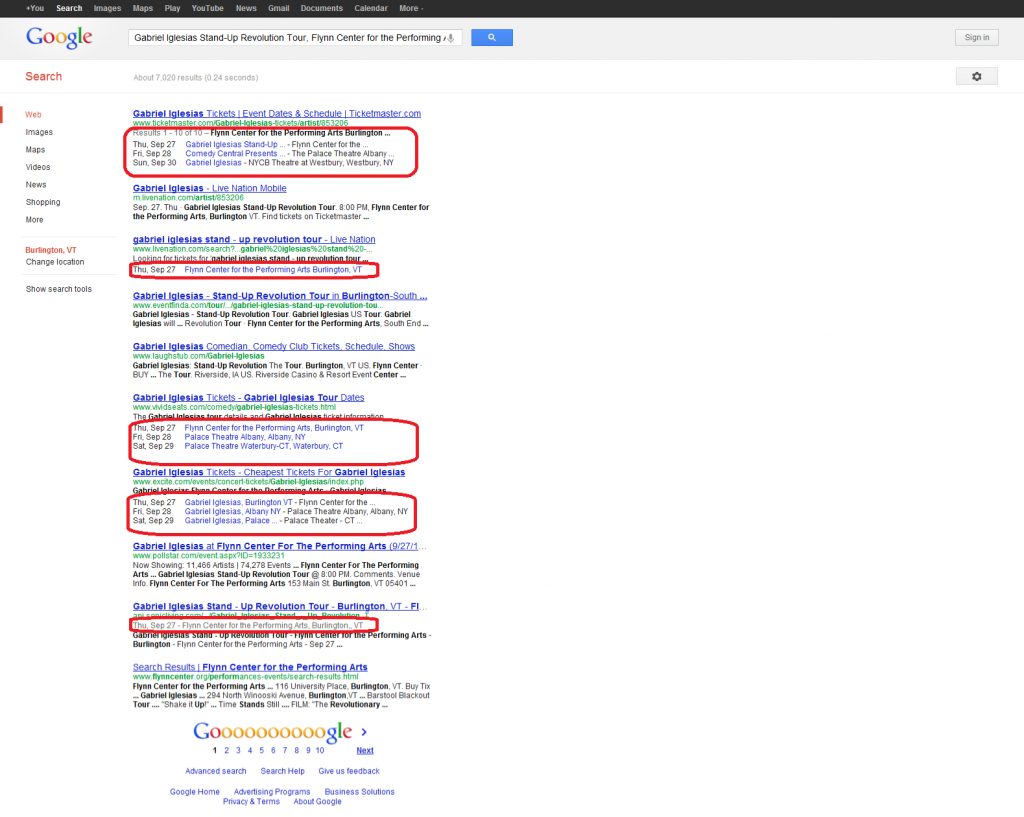
Google is crawling and displaying rich snippet data, in some form, from 5 out of the top 10 search results! We'll talk more about rich snippets and Google's increased use of them in search results in a future post, but it's worth noting here because it seems that the websites in these search results are of the variety that Google is using to scrape data from for the knowledge graph's "Upcoming events" section.
So, why does Burlington get these little extras in its Knowledge Graph that Winooski doesn't? Probably because Winooski doesn't have any venues for concerts or tourist attractions. For us locals, we've seen the revitalization that's been taking place over the past few years and the addition of several great restaurants, but it remains a tiny city that isn't able to offer tourists all of what Burlington is with it's larger downtown and waterfront access.
Ads on Knowledge Graph Search Results Pages?
I should also point out that there are Adwords hotel/travel ads showing up at the bottom of the results for the Burlington search. In yesterday's post I mentioned that I hadn't seen ads on search results pages that included the Knowledge Graph, but I've noticed quite a few today. This prompted me to go back and review some of yesterday's screenshots and it appears there were some ads I had missed there as well. This was either due to the industry ad blindness I've developed over the years or the fact that my focus was on the Knowledge Graph. Maybe a little of both. Either way, my original theory about no ads showing on Knowledge Graph results pages has been blown to smithereens, but I still think the CTRs/ad revenue (for Google) will dip on these pages as more real estate is dedicate to information rather than the ads. A small sacrifice they're wisely making to keep users happy and regularly using their Google for their searches.
Great Escape Knowledge Graph & Theater Show Times?
Getting back to what I original set out to write this post about - Google search results for 'great escape'. If you're from or live in the Burlington, VT area, you're probably familiar with the nearby (2 hours) amusement park
The Great Escape near Lake George, NY. After noting in yesterday's
Knowledge Graph Carousel blog post that our local theme parks weren't included in the 20 item Carousel that showed for the national search, I assumed and decided to check if Google's Knowledge Graph still had information on the Great Escape:
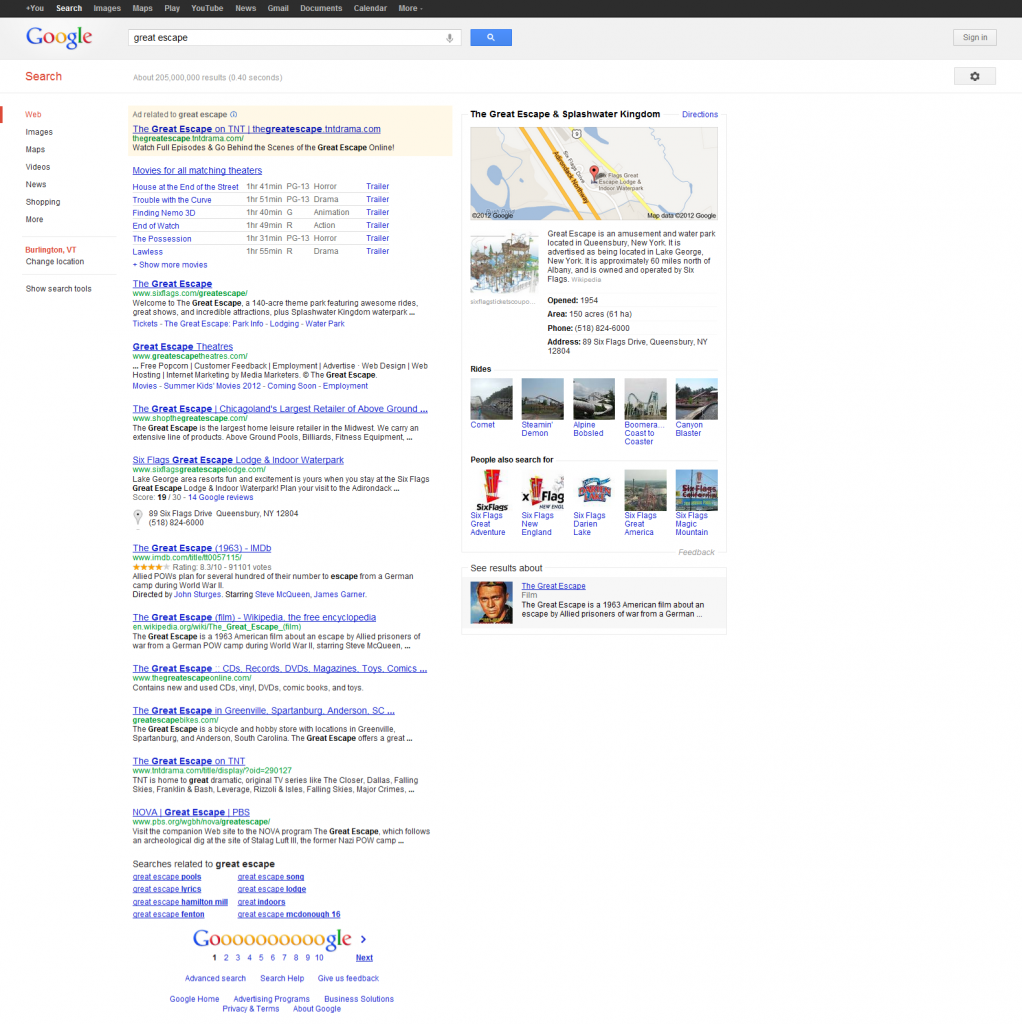
Clearly Google does have Great Escape specific knowledge graph info, with a couple of other bonuses I'll get back to in a moment, but there's something else a little odd on these search results outside of the Knowledge Graph. Did you see all of the movie information above the organic results? And that's not info about the old Steve McQueen movie The Great Escape, but current current titles. These are the types of current movie results that normally display when you're searching for "movie times". Normally when you click one, it takes you to
more information about the film, including all local showtimes, like you see here:
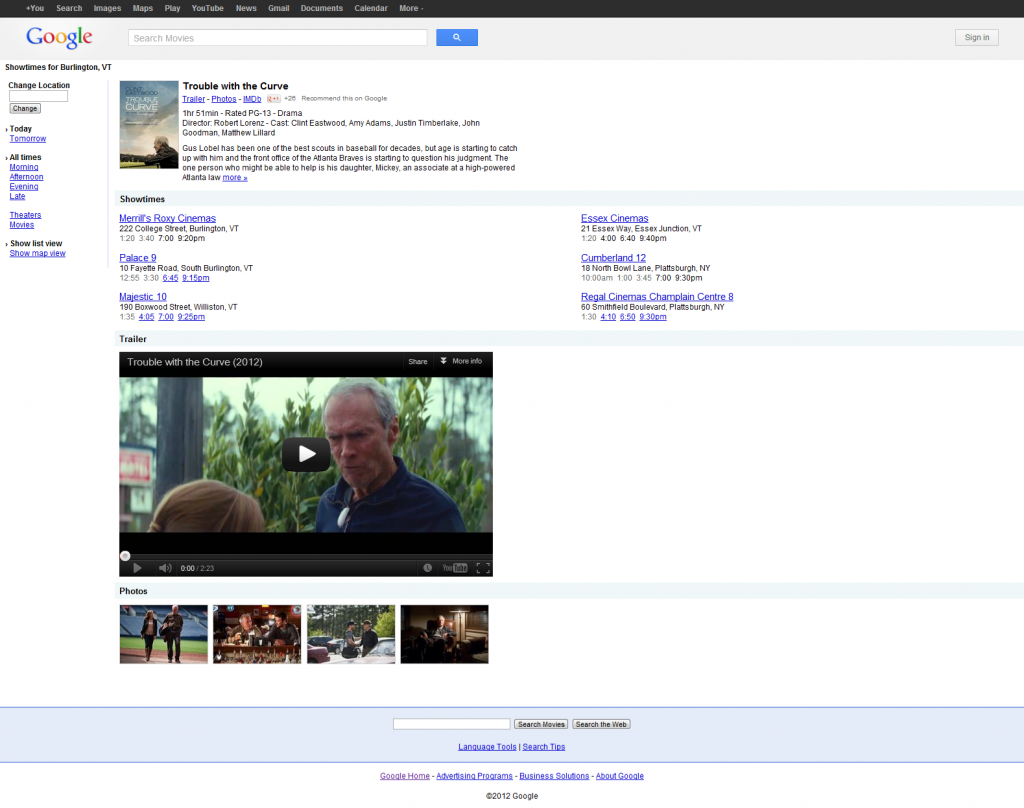
Again, that's normally where you wind up when you're searching for local movie times. But why are these results being displayed for my Great Escape search? It took clicking the link just above the individual titles, to figure it out - "
Movies for all matching theaters".
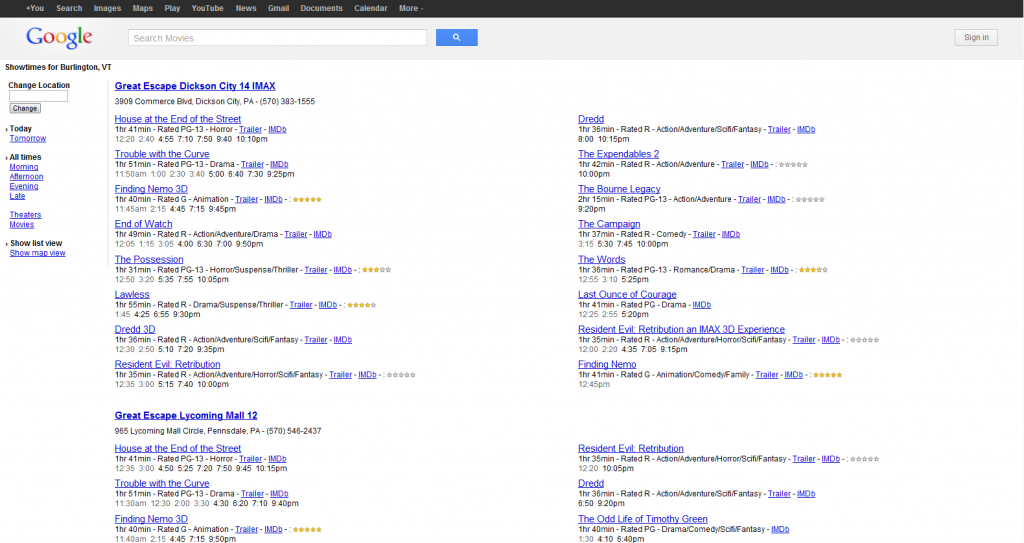
Aha! There's a a major movie theater chain called "Great Escape". But they don't have any in this area, so you would think that Google would have used my location settings and determined that this wasn't what I was looking for at all. It's always important to remember, however, that we're still dealing with artificial intelligence that will never be 100% perfect. Anyway, the point is Google displayed results this way because it assumed I was looking for a Great Escape theater the same way it does when you search '
regal cinemas'. It's just strange to see here in VT because the closest Great Escape theater is several states and hundreds of miles away.
Before I get off this movie time search result tangent and back to the Knowledge Graph, I also wanted to heap a little big of praise on Google for the normal movie info results. As I showed you above, they're incredibly useful when you click through and can easily see the movie times at all of your local theaters. But back up to the search results page again for a minute... Did you notice the "Trailer" button to the right of each movie title? If you click it, Google actually throws up a cool overlay window that contains a YouTube video of the trailer along with a film synopsis along as well as director and cast info:
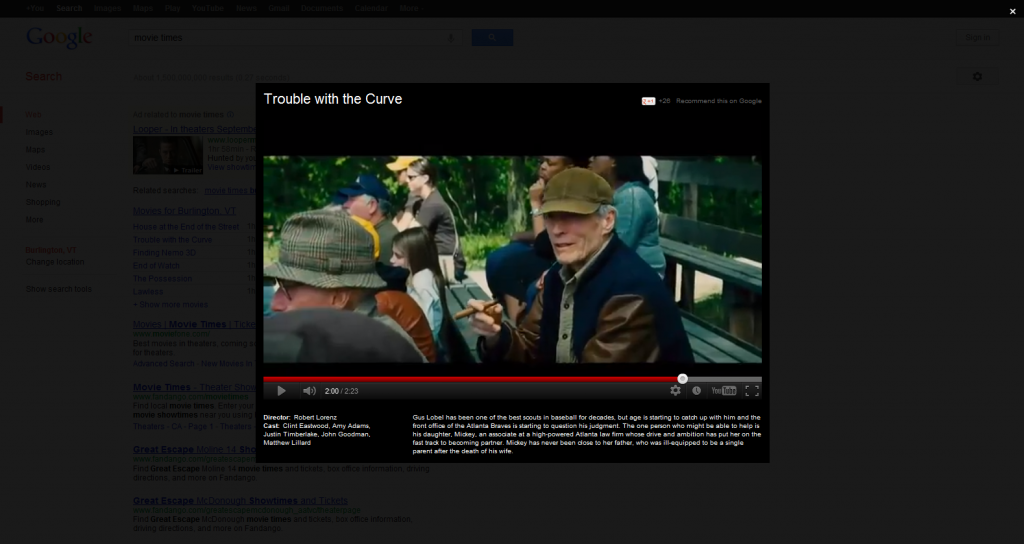
This is a handy little feature because it saves users the extra step of searching for the trailer on YouTube, etc. if they do want to see it. Or, imagine how useful this would be if you know you want to go to a movie, but you haven't picked one out yet. Maybe you saw a commercial on TV but you can't remember the title or you'd like to see the extended trailer before you decide on seeing it. If it wasn't obvious, as a web professional, I'm just a really impressed with how they set this trailer overlay up - from a usability standpoint. Also interesting is the fact that if you click over to watch any of the videos directly on YouTube, you'll see hat they're all uploaded by user "
Googlemovietrailers", yet when you try to "
Browse videos", it shows the user has none? Still, it's worth pointing out that Google itself, rather than just the film studios, is uploading these videos.
Great Escape Rides Carousel (....Not Carousel Ride)
Getting back to the Knowledge Graph, you can clearly see that Google has understandably chosen different data points than what it uses for cities. (
Pretty sure amusement parks don't have populations anyway). Google provides some basic address and contact info, along with the year the park opened. On to the cool part - they've been able to pull in data for 5 specific rides and if you click one, it takes you to
Carousel results like we looked at yesterday. There's also a "People also search for" section which contains items that when clicked will take you to a separate carousel. Screenshots below of both:
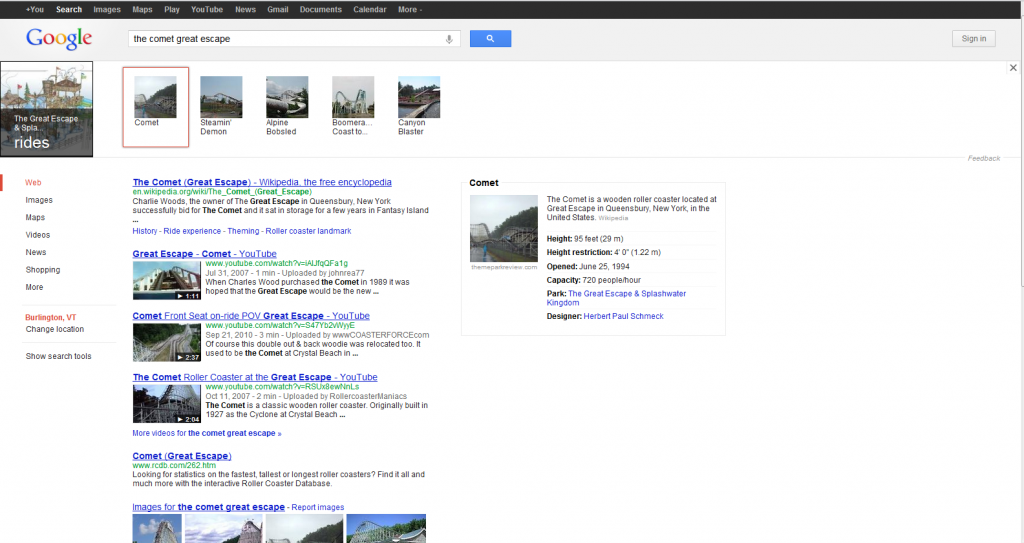
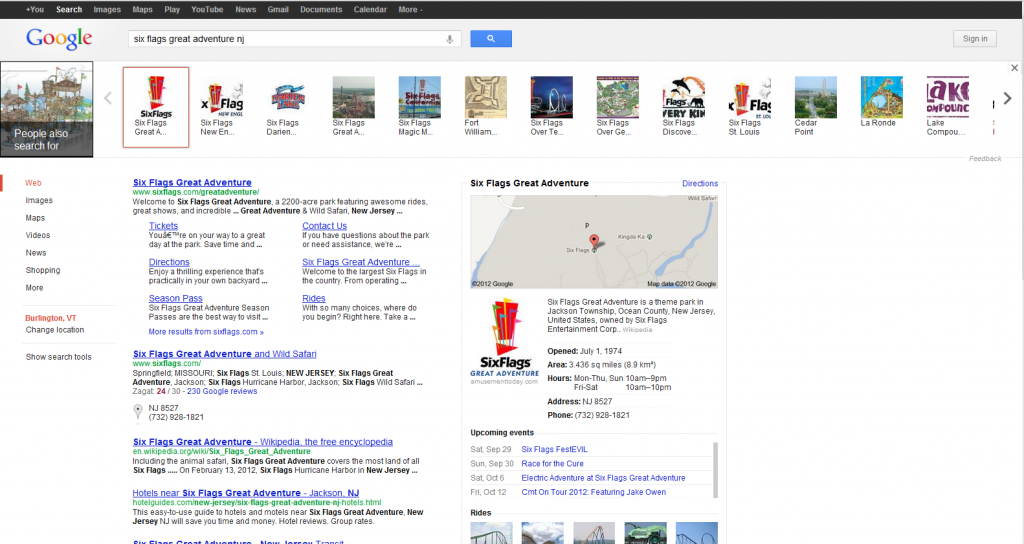
You may have noticed in the original screenshot that Google also managed to sneak in a "See results about" section in the knowledge graph that was about the old Steve McQueen movie I referred to earlier, "The Great Escape". If you clicked anywhere in that section, you're taken to a whole new search results page with its own Knowledge Graph, which itself links to multiple Carousels and other Knowledge Graph results pages, carrying you further and further down the rabbit hole:
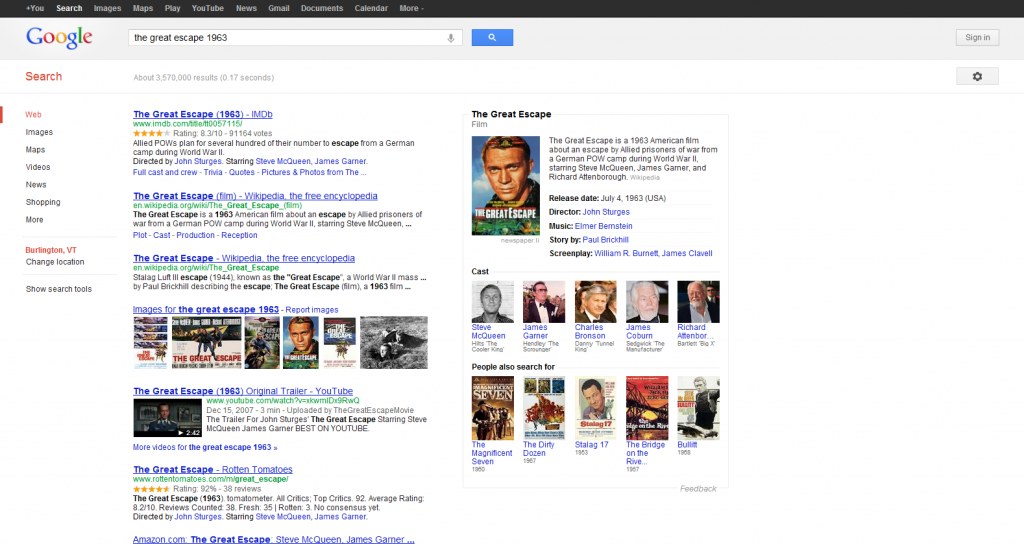
Lastly, I mentioned earlier that Google is showing ads even on Knowledge Graph pages, and the Great Escape example was no exception. You may have noticed the ad for a new TNT television show called "The Great Escape" at the top of the original screenshot. So we've got ads, knowledge graph info about theme parks and movies in the same place, with links to Carousel results pages, etc. Quite a bit to keep track of.
I think it's safe to say that things like that these ain't your daddy's search results. With things like movie information and the Knowledge Graph, I'd say we're now in the era of "smarter search results". It's interesting to try to imagine how things might change over time, because that's the only thing we're guaranteed of when it comes to the appearance of Google search results - constant change. As an SEO/PPC specialist, I often feel like asking "Are we there yet?", as it pertains to the perfect search engine/results pages. But the truth is, we'll never "be there". All we can do is monitor changes, adapt, test and track.

 Both searches are so generic that Google displays the knowledge graph because they safely assume that there's a good chance the user is looking for general information. Under the basic description area, Burlington's knowledge graph shows the following 4 data points and in this order: Area, Weather, Population, Local time. Winooski shows the same 4, but flips the order for Population and Local Time for some reason. It's unclear why. At any rate, the map, town description and those 4 data points are all the knowledge graph shows about Winooski, but Google displays more info for Burlington.
Note that in Burlington's Knowledge Graph section, Google includes a scrollable "Upcoming Events" section and a "Points of Interest" section. As always, following any of these links simply takes you to drilled down search results pages, which doesn't make it easy to figure out where Google pulls that data from. I do however see that most of those search results pages appear to be displaying structured data (a.k.a rich snippets, a.k.a schema markup) from a variety of other event sites. Basically Google couldn't rely on a single database to supply all up-to-date event info so they appear to be using websites that are marked up with rich snippets like ticketmaster.com, excite.com/events, zevents.com, seatgeek.com, songkick.com, etc.
Check out these examples from the search results for the first item in the "Upcoming events" list - Gabriel Iglesias Stand-Up Revolution Tour, Flynn Center for the Performing Arts, Burlington:
Both searches are so generic that Google displays the knowledge graph because they safely assume that there's a good chance the user is looking for general information. Under the basic description area, Burlington's knowledge graph shows the following 4 data points and in this order: Area, Weather, Population, Local time. Winooski shows the same 4, but flips the order for Population and Local Time for some reason. It's unclear why. At any rate, the map, town description and those 4 data points are all the knowledge graph shows about Winooski, but Google displays more info for Burlington.
Note that in Burlington's Knowledge Graph section, Google includes a scrollable "Upcoming Events" section and a "Points of Interest" section. As always, following any of these links simply takes you to drilled down search results pages, which doesn't make it easy to figure out where Google pulls that data from. I do however see that most of those search results pages appear to be displaying structured data (a.k.a rich snippets, a.k.a schema markup) from a variety of other event sites. Basically Google couldn't rely on a single database to supply all up-to-date event info so they appear to be using websites that are marked up with rich snippets like ticketmaster.com, excite.com/events, zevents.com, seatgeek.com, songkick.com, etc.
Check out these examples from the search results for the first item in the "Upcoming events" list - Gabriel Iglesias Stand-Up Revolution Tour, Flynn Center for the Performing Arts, Burlington:
 Google is crawling and displaying rich snippet data, in some form, from 5 out of the top 10 search results! We'll talk more about rich snippets and Google's increased use of them in search results in a future post, but it's worth noting here because it seems that the websites in these search results are of the variety that Google is using to scrape data from for the knowledge graph's "Upcoming events" section.
So, why does Burlington get these little extras in its Knowledge Graph that Winooski doesn't? Probably because Winooski doesn't have any venues for concerts or tourist attractions. For us locals, we've seen the revitalization that's been taking place over the past few years and the addition of several great restaurants, but it remains a tiny city that isn't able to offer tourists all of what Burlington is with it's larger downtown and waterfront access.
Google is crawling and displaying rich snippet data, in some form, from 5 out of the top 10 search results! We'll talk more about rich snippets and Google's increased use of them in search results in a future post, but it's worth noting here because it seems that the websites in these search results are of the variety that Google is using to scrape data from for the knowledge graph's "Upcoming events" section.
So, why does Burlington get these little extras in its Knowledge Graph that Winooski doesn't? Probably because Winooski doesn't have any venues for concerts or tourist attractions. For us locals, we've seen the revitalization that's been taking place over the past few years and the addition of several great restaurants, but it remains a tiny city that isn't able to offer tourists all of what Burlington is with it's larger downtown and waterfront access.
 Clearly Google does have Great Escape specific knowledge graph info, with a couple of other bonuses I'll get back to in a moment, but there's something else a little odd on these search results outside of the Knowledge Graph. Did you see all of the movie information above the organic results? And that's not info about the old Steve McQueen movie The Great Escape, but current current titles. These are the types of current movie results that normally display when you're searching for "movie times". Normally when you click one, it takes you to more information about the film, including all local showtimes, like you see here:
Clearly Google does have Great Escape specific knowledge graph info, with a couple of other bonuses I'll get back to in a moment, but there's something else a little odd on these search results outside of the Knowledge Graph. Did you see all of the movie information above the organic results? And that's not info about the old Steve McQueen movie The Great Escape, but current current titles. These are the types of current movie results that normally display when you're searching for "movie times". Normally when you click one, it takes you to more information about the film, including all local showtimes, like you see here:
 Again, that's normally where you wind up when you're searching for local movie times. But why are these results being displayed for my Great Escape search? It took clicking the link just above the individual titles, to figure it out - "Movies for all matching theaters".
Again, that's normally where you wind up when you're searching for local movie times. But why are these results being displayed for my Great Escape search? It took clicking the link just above the individual titles, to figure it out - "Movies for all matching theaters".
 Aha! There's a a major movie theater chain called "Great Escape". But they don't have any in this area, so you would think that Google would have used my location settings and determined that this wasn't what I was looking for at all. It's always important to remember, however, that we're still dealing with artificial intelligence that will never be 100% perfect. Anyway, the point is Google displayed results this way because it assumed I was looking for a Great Escape theater the same way it does when you search 'regal cinemas'. It's just strange to see here in VT because the closest Great Escape theater is several states and hundreds of miles away.
Before I get off this movie time search result tangent and back to the Knowledge Graph, I also wanted to heap a little big of praise on Google for the normal movie info results. As I showed you above, they're incredibly useful when you click through and can easily see the movie times at all of your local theaters. But back up to the search results page again for a minute... Did you notice the "Trailer" button to the right of each movie title? If you click it, Google actually throws up a cool overlay window that contains a YouTube video of the trailer along with a film synopsis along as well as director and cast info:
Aha! There's a a major movie theater chain called "Great Escape". But they don't have any in this area, so you would think that Google would have used my location settings and determined that this wasn't what I was looking for at all. It's always important to remember, however, that we're still dealing with artificial intelligence that will never be 100% perfect. Anyway, the point is Google displayed results this way because it assumed I was looking for a Great Escape theater the same way it does when you search 'regal cinemas'. It's just strange to see here in VT because the closest Great Escape theater is several states and hundreds of miles away.
Before I get off this movie time search result tangent and back to the Knowledge Graph, I also wanted to heap a little big of praise on Google for the normal movie info results. As I showed you above, they're incredibly useful when you click through and can easily see the movie times at all of your local theaters. But back up to the search results page again for a minute... Did you notice the "Trailer" button to the right of each movie title? If you click it, Google actually throws up a cool overlay window that contains a YouTube video of the trailer along with a film synopsis along as well as director and cast info:
 This is a handy little feature because it saves users the extra step of searching for the trailer on YouTube, etc. if they do want to see it. Or, imagine how useful this would be if you know you want to go to a movie, but you haven't picked one out yet. Maybe you saw a commercial on TV but you can't remember the title or you'd like to see the extended trailer before you decide on seeing it. If it wasn't obvious, as a web professional, I'm just a really impressed with how they set this trailer overlay up - from a usability standpoint. Also interesting is the fact that if you click over to watch any of the videos directly on YouTube, you'll see hat they're all uploaded by user "Googlemovietrailers", yet when you try to "Browse videos", it shows the user has none? Still, it's worth pointing out that Google itself, rather than just the film studios, is uploading these videos.
This is a handy little feature because it saves users the extra step of searching for the trailer on YouTube, etc. if they do want to see it. Or, imagine how useful this would be if you know you want to go to a movie, but you haven't picked one out yet. Maybe you saw a commercial on TV but you can't remember the title or you'd like to see the extended trailer before you decide on seeing it. If it wasn't obvious, as a web professional, I'm just a really impressed with how they set this trailer overlay up - from a usability standpoint. Also interesting is the fact that if you click over to watch any of the videos directly on YouTube, you'll see hat they're all uploaded by user "Googlemovietrailers", yet when you try to "Browse videos", it shows the user has none? Still, it's worth pointing out that Google itself, rather than just the film studios, is uploading these videos.

 You may have noticed in the original screenshot that Google also managed to sneak in a "See results about" section in the knowledge graph that was about the old Steve McQueen movie I referred to earlier, "The Great Escape". If you clicked anywhere in that section, you're taken to a whole new search results page with its own Knowledge Graph, which itself links to multiple Carousels and other Knowledge Graph results pages, carrying you further and further down the rabbit hole:
You may have noticed in the original screenshot that Google also managed to sneak in a "See results about" section in the knowledge graph that was about the old Steve McQueen movie I referred to earlier, "The Great Escape". If you clicked anywhere in that section, you're taken to a whole new search results page with its own Knowledge Graph, which itself links to multiple Carousels and other Knowledge Graph results pages, carrying you further and further down the rabbit hole:
 Lastly, I mentioned earlier that Google is showing ads even on Knowledge Graph pages, and the Great Escape example was no exception. You may have noticed the ad for a new TNT television show called "The Great Escape" at the top of the original screenshot. So we've got ads, knowledge graph info about theme parks and movies in the same place, with links to Carousel results pages, etc. Quite a bit to keep track of.
I think it's safe to say that things like that these ain't your daddy's search results. With things like movie information and the Knowledge Graph, I'd say we're now in the era of "smarter search results". It's interesting to try to imagine how things might change over time, because that's the only thing we're guaranteed of when it comes to the appearance of Google search results - constant change. As an SEO/PPC specialist, I often feel like asking "Are we there yet?", as it pertains to the perfect search engine/results pages. But the truth is, we'll never "be there". All we can do is monitor changes, adapt, test and track.
Lastly, I mentioned earlier that Google is showing ads even on Knowledge Graph pages, and the Great Escape example was no exception. You may have noticed the ad for a new TNT television show called "The Great Escape" at the top of the original screenshot. So we've got ads, knowledge graph info about theme parks and movies in the same place, with links to Carousel results pages, etc. Quite a bit to keep track of.
I think it's safe to say that things like that these ain't your daddy's search results. With things like movie information and the Knowledge Graph, I'd say we're now in the era of "smarter search results". It's interesting to try to imagine how things might change over time, because that's the only thing we're guaranteed of when it comes to the appearance of Google search results - constant change. As an SEO/PPC specialist, I often feel like asking "Are we there yet?", as it pertains to the perfect search engine/results pages. But the truth is, we'll never "be there". All we can do is monitor changes, adapt, test and track.
